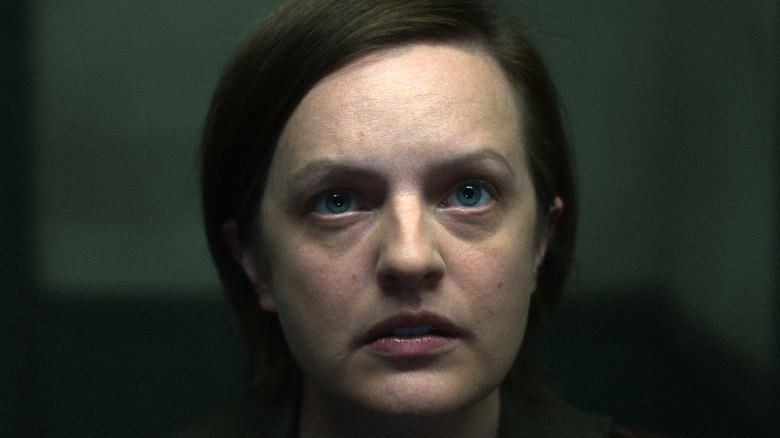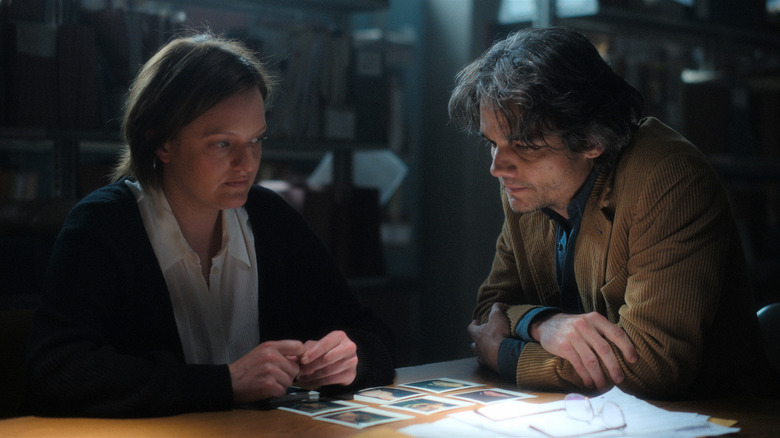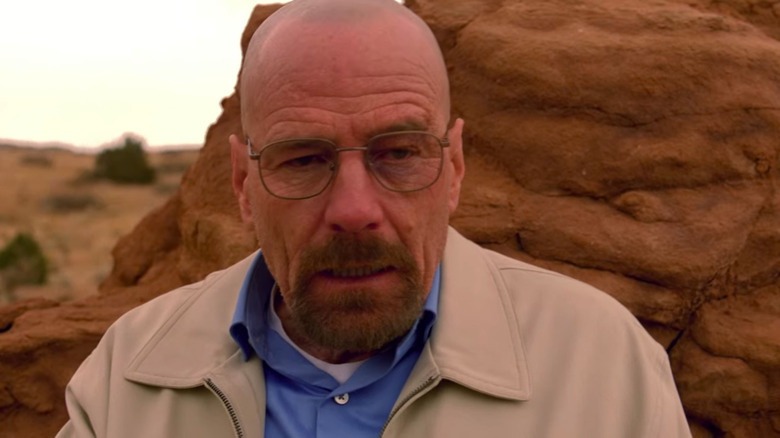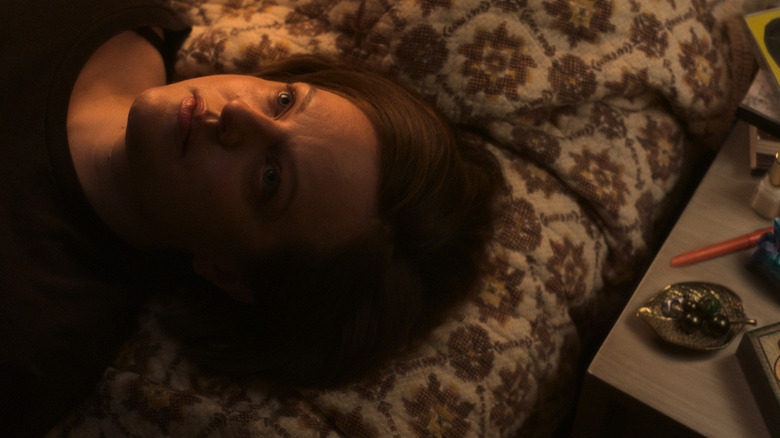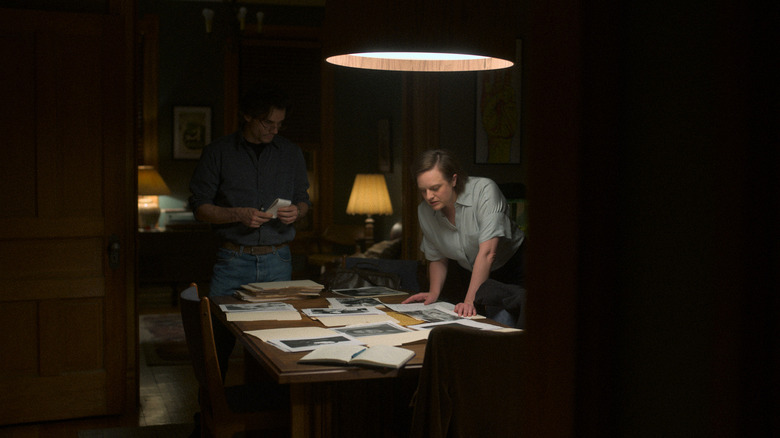Shining Girls Director Michelle MacLaren On The Show's Unique Style And Elisabeth Moss - Exclusive Interview
Apple TV+'s new eight-episode series "Shining Girls," based on the bestselling novel of the same name by Lauren Beukes, is described as a metaphysical thriller, but it's much more than that. A study of trauma, a murder mystery, a meditation on resilience, and a sci-fi mind-trip, the show is a genre-bending vision that will keep viewers guessing from the moment it introduces main character Kirby Mazrachi (Elisabeth Moss, who also serves as a director and executive producer on the project).
Kirby, a newspaper archivist in Chicago in the 1990s, is the only survivor of a serial killer whose victims have turned up across decades, so when she learns about a new murder that resembles her case, she teams up with reporter Dan Valazquez (Wagner Moura) to track down the perpetrator. The question isn't so much who did it — the killer is identified in the first episode. It's how and why, and what does it have to do with the strange shifts in reality Kirby has endured since her attack?
Setting the tone for the series is director Michelle MacLaren, who helmed the first two episodes. The Emmy Award-winner, who's also an executive producer on the series, creates the look and feel of the difficult story, including its fluid changes in time and genre. MacLaren has produced and directed a plethora of beloved and critically acclaimed shows, including "The X-Files," "Breaking Bad," "The Walking Dead," "Game of Thrones," and "The Leftovers." She brings all that experience to "Shining Girls," which she establishes as a gripping head-scratcher.
In an exclusive interview with Looper, MacLaren explained how she set up the many moving parts of the genre-bending show in the pilot, the lessons from her previous directing work that she leaned on for "Shining Girls," and her experience collaborating with Elisabeth Moss.
Establishing the show's unique look and feel
"Shining Girls" is a challenging story. As the director of the pilot, you had to establish the story from the perspective of main character Kirby, whose reality is constantly shifting. It has all these moving parts that even she's trying to keep track of. What was your process for accomplishing that?
I'm glad that you found it challenging and ambiguous at first and hard to figure out because that's what we intended, because these time shifts are a metaphor for the aftermath of trauma. [Kirby's] life is incredibly unbalanced. I wanted [the show] to feel really grounded and real and to throw the audience off and [have them] find it unbalancing and somewhat confusing because that's what she's going through. Could you imagine going along in life and you turn around, everything's changed?
This is something that she has to embrace and deal with and try and get to the truth while experiencing this. That is very much a metaphor for trauma. A grounded, real approach was really important to all of us. That's why we really deal with these shifts starting out very much in editorial fashion. It's something that's tangible for the audience.
The look and feel of the show has elements of '90s procedurals, these really scary moments, horror moments, fantastical flourishes. How did you go about establishing that?
One of the things that really attracted me to this project, in addition to the amazing scripts, Lizzie Moss, Apple TV+, all these elements, was the fact that it's genre-bending. My influences for this were "All the President's Men," "Se7en," Michael Mann's "The Insider," [and] "Zodiac." These [are] very different movies, and it was challenging and fun and scary to bring them all together. That was something I hadn't done before.
When I look at projects that are a little bit scary — which is why I take them on, because I think they're challenging, I haven't done it before. If it interests me, if the characters interest me and it's a world I want to experience, you can be daunted by a challenge like this, and then ... I break it down into pieces and approach each from the most authentic way I can find to tell that particular story in that moment. In this case, we do have somebody whose world is unraveled, it's very unbalanced, and [I] wanted to create that feeling and emotion for the audience.
Bringing lessons from past experiences to Shining Girls
You directed episodes of some incredible shows, including "Breaking Bad," "The Walking Dead," [and] "Game of Thrones." What did you learn from those experiences that you brought to "Shining Girls"?
I learn something from everything that I do ... that's a really good question. "Walking Dead" and "Game of Thrones," and less so [with] "Breaking Bad," have very fantastical elements to them that we approach in a very real, grounded way. We approach "Breaking Bad" in a very real, grounded way as well. I learned how to show dragons flying and zombies doing whatever, if you approach it in a very realistic manner, it can really feel like it's happening.
It's subjective storytelling. It's what I was taught and learned a lot about on "The X-Files." We're always perfecting it. I learn on every project that I can do, but in this particular instance, working in a number of different genres and then being able to work on one thing that is genre-bending, it's exciting to bring those different things you learn from those different projects to one place.
Working with Elisabeth Moss and other big names
The show focuses on Elisabeth Moss's character. In this project, she's not only the star, but she's a fellow director and executive producer too. What was it like to work with her?
Lizzie is amazing. As an actress, we all know she's brilliant. She's equally brilliant as a director, and she's a wonderful executive producer. She's a great collaborator. That was exciting and fun to work with her. It was a joy to work with her. We took a deep dive into studying these characters and the style and tone of the show.
Our episodes are very intertwined. We even had some days where we did tag team directing because I was doing a scene a particular way, and then she'd be doing the same scene in another way. We needed, for various reasons, to do them one after another. We worked very closely on both fronts. Lizzie's brilliant. She's got the versatility and the facile-ness and the nuance. It is mind-blowing.
You've worked with amazing actors before, like Bryan Cranston, Bob Odenkirk, [and] many of the cast of "Game of Thrones." How did working with Elisabeth Moss compare with those big names?
Everybody's different. When I'm working with Lizzie, sometimes, I think of Bryan Cranston [who starred in "Breaking Bad"], because Bryan and Lizzie have this incredible ability to understand things from both a character point of view and a director point of view. You can be walking over to give them a note, and they'll all of a sudden say, "Oh, hey, you need me to do [a certain task]" from a directing [perspective]. You're like, "Yeah," or you go over and give a note from a character way, and they're an incredible instrument that takes a note and does a tiny little change and makes it suddenly brilliant.
Their versatility is wonderful. She reminds me a lot of Bryan in that way, but every actor's different. It's an experience each time. I feel really lucky to work with such talented people because that director-actor relationship, that's the most exciting thing about directing.
Carrying the vision for the show as an executive producer
In addition to directing you're an executive producer on "Shining Girls." Why was this something you wanted to be involved in on that level?
It's a highly serialized project. [With] what we were setting up at the beginning, we were setting things up that aren't going to be paid off until Episode 8. When you come into a project and you're starting it out, and you're setting the tone and the look and the style, it's really nice to be involved all the way through so that you can help carry that vision all the way through.
Silka Luisa is the showrunner. She did a brilliant job of writing these scripts, and she's an awesome showrunner. It's nice to be that involved to hopefully help with the visual style throughout. We had amazing directors with Daina Reid and Lizzie, so it's a collaboration that everybody had on every level, whether it's the music, or the production design, or the writing, or whatever. It's great to be able to keep your hand in things until delivery, but it's a collaboration. It's everybody's vision, with Silka at the helm of it.
Also, I like working with Apple TV+. It makes a difference where you're working, and I've had the privilege of working at some great studios and networks, and this is one of them.
This interview was edited for clarity.
The first three episodes of "Shining Girls" debut on Apple TV+ on April 29, with new episodes premiering every Friday.
